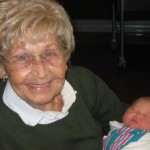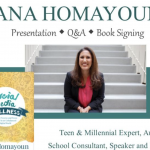Gifts From Your Grandparents You CAN’T Return
 My grandmother is 95 years old and her only complaint is old age. My grandfather is 100. His only complaint is my grandmother. These are my mother’s parents. Before my mom was diagnosed with ovarian cancer at the age of 58, we all used to marvel at our genetics — to the point we would actually complain about how exhausting it will be to have to live soooo long. After my mom’s diagnosis, all kinds of relatives and their unspoken-about conditions crawled out of the family tree. Turns out, there is a lot we didn’t know, a lot we still don’t know. Maybe DNA did, in fact, contribute to the genesis of her illness. Maybe it didn’t. Does family history matter? YES! Do a little investigating before it is too late.
My grandmother is 95 years old and her only complaint is old age. My grandfather is 100. His only complaint is my grandmother. These are my mother’s parents. Before my mom was diagnosed with ovarian cancer at the age of 58, we all used to marvel at our genetics — to the point we would actually complain about how exhausting it will be to have to live soooo long. After my mom’s diagnosis, all kinds of relatives and their unspoken-about conditions crawled out of the family tree. Turns out, there is a lot we didn’t know, a lot we still don’t know. Maybe DNA did, in fact, contribute to the genesis of her illness. Maybe it didn’t. Does family history matter? YES! Do a little investigating before it is too late.
1. Family history is important to know because it is a piece of the information helping doctors determine your risk for disease. Just as you inherited your blue eyes and your laugh, you may have inherited a predisposition for illness. Additionally, not only do family members share DNA, they often share the same environment and habits which predispose them to certain diseases.
2. Doctors use family history as another piece of the puzzle. It helps us decide your need for screening tests. It may alter the age at which you need to be tested as well as the type of test you should have. It aids in early detection. For instance, a strong family history of breast or colon cancer will likely prompt a physician to suggest a screening earlier than that recommended for the general population. For instance, I am screened every six months for ovarian cancer. It will also help us give advice on modifying your other risks for disease. If you have a genetic predisposition toward heart disease, it will be even more important for you to control your weight, cholesterol, etc.
3. What should you know? You should know or try to find out the following about three generations of family, including your grandparents, parents, aunts and uncles, first cousins and siblings:
– age at time of diagnosis
– age and cause of death
– all health conditions
– mental health, including addiction
– genetic defects and pregnancy complications (especially for family planning)
– lifestyle factors to tease out environmentally induced disease
4. How to find out your family history – Sources will say to look at birth and death certificates – good luck finding those. I don’t even know where my wallet is. Your best bet is to speak to family members, preferably now, before they die. Make them understand that your purpose is to compile data which will be useful for everyone’s health record. Be considerate and respect their privacy. Set aside some time for the conversation and have a pen and paper. Write down everything, you can even tape record it. Something may become important later. Often it is helpful to provide people with the opportunity to write about it rather than talk about it. There may be some sensitive topics. The generations above us are especially closed off when it comes to illness – remember, they didn’t use the “C” word back then.
5. What isn’t important? In my first year of medical school, we were given an hour to obtain a patient’s history. After hours in the anatomy lab, we would wash up and sit with patients in the hospital — who have nothing but time on their hands — to compile an actual genogram. Once I started practicing, that never happened again. In today’s medical climate, there simply isn’t enough time for a doctor to listen to the gory details of Aunt Betty’s gallbladder disaster. Bring your doc a written form with your family history if you are afraid you won’t have time to convey it all. The following are things that are unimportant:
– distant relatives (unless their condition helps to enforce a pattern in the family)
– accidents
– most infectious diseases
– illnesses with an obvious cause (if Uncle Bob smoked 2 packs a day and died of lung cancer, you probably don’t need a chest xray)
Lots of people don’t know their family history and don’t have the opportunity to obtain one. These patients will often just check “NO” next to every condition on the intake form in the waiting room. Don’t do that. It is important to let you doctor know you don’t know, whether it is because of adoption, estranged families or kooky relatives. One more point – just because heart disease doesn’t seem to run in your family does not mean you can lay on the couch eating McDonald’s all day. Your risk of disease cannot be blamed on family alone.




















